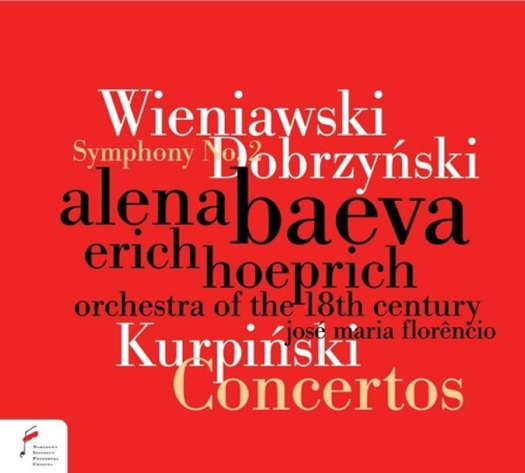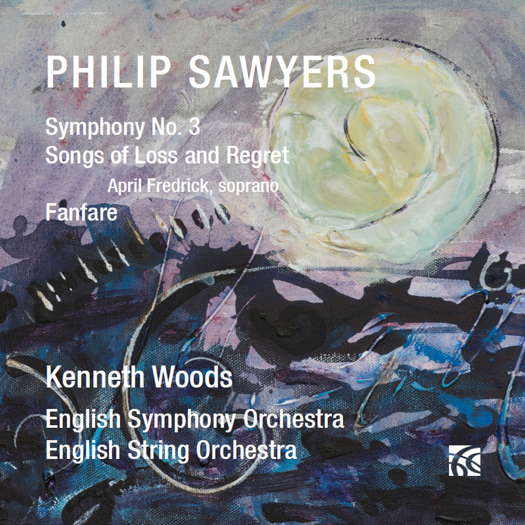- Lennox Berkeley
- Isolde
- Ton Hartsuiker
- Carl Nielsen
- William Barton
- Gerd Albrecht
- Reinbert de Leeuw
- Kiki de Montparnasse

Spirit of a Nation
GERALD FENECH is impressed by music of nineteenth century Polish composers Henryk Wieniawski, Ignacy Feliks Dobrzyński and Karol Kurpiński
'... both players and soloists surpass themselves with passionate renditions ...'
This is a marvellous CD focusing on a nineteenth century trio of Polish composers, whose popularity, bar one, is almost non-existent. Ignacy Feliks Dobrzyński was born on 15 February 1807 in what is now Romaniv Zhytomyr Oblast in war-torn Ukraine. He received his first education at a Jesuit school in Romanov, then continued his studies at Vinnitsa, where he graduated from the Podole Gymnasium. He first studied music with his father Ignacy, a violinist, composer and music director. In 1825 he continued his musical education in Warsaw with Jozef Elsner on a private basis, then in 1826-28 at the Warsaw Conservatory, where he was a classmate of Frederic Chopin.
In 1935 he won second prize in a composition competition for his Second Symphony in C minor, Op 15, a work overflowing with rhythmic vigour and danceable melodies that are very reminiscent of Poland's musical heritage. Indeed, the work was later called Symphony in the Characteristic of Polish music. The piece attained great popularity, and Mendelssohn even conducted some of the movements.
Listen — Dobrzyński: First movement (Characteristic Symphony)
(NIFCCD078 track 6, 3:44-4:34) ℗ 2022 National Institute Frederick Chopin :
Dobrzyński's fame grew as the years rolled by, and by 1845 he was in a position to tour Germany not only as a soloist, but also as a conductor of operas and concerts. This issue also includes the composer's first official composition, the Concert Overture, Op 1, a lively piece full of harmonic swagger and knock-out tunes that deserves to be more known and enjoyed. Dobrzyński died on 9 October 1867 aged sixty, leaving for posterity a small corpus of works that are as beautiful as they are important in the annals of Polish musical history.
Karol Kurpiński was born on 6 March 1785 in Włoszakowice, Poland. His first teacher was his father, Marcin, an organist of no mean ability. At the age of twelve he picked up his father's instrument and became organist at a church in Sarnowa near Rawicz, where his uncle Karol Wanski was a parish priest. In 1800 his other uncle, the cellist Roch Wanski, took him to the estate of Count Feliks Polanowski near Lviv, who had a private orchestra of which Wanski was a member, and in which the young Kurpiński played the violin. There, around 1808, the young composer wrote his first opera, Pygmalion. In 1810 he settled in Warsaw and, with the help of Jozef Elsner, he became a conductor of the Warsaw Opera, a position he held until 1840. He taught at several prominent schools, including one he founded. In 1815 he became a member of many musical societies in Poland and abroad, and in 1819 he was awarded the post of Kapellmeister of the Polish Royal Chapel. In that same year he was the recipient of a lifetime achievement award for his services to music.
In 1820 he founded and edited the first Polish music newsletter, and in 1823 was decorated with the Order of Saint Stanislaus. In 1829, together with Elsner, he was commissioned to write music for the Coronation of Nicholas I of Russia. For this occasion, Kurpiński composed a Te Deum which, unfortunately, was performed again only in 2011. Kurpiński was a romanticist and one of the most revered composers before Chopin, who he met in 1828. He helped to lay the foundations of a national style and prepared the ground for Polish music of the Romantic period. He also contributed to the development of Polish opera, introducing new musical devices and achieving a novel mode of expression. He died on 18 September 1857 in Warsaw, aged seventy-two.
The Clarinet Concerto dates from around 1823, when Kurpiński met several eminent musicians of his day while on a European tour that lasted several months. Cherubini, Spohr and Weber were, among others, three that he made the acquaintance of. The piece was finished in Paris three months after meeting Weber, but sadly, only the first movement has come down to us. We know for sure that the concerto was in three movements with a rondo finale, still, this extant first movement, which lasts about ten minutes, delights one, above all, with the charm of its three themes and the silky elegance with which the dialogue between soloist and orchestra is led.
Listen — Kurpiński: Clarinet Concerto
(NIFCCD078 track 5, 1:44-2:34) ℗ 2022 National Institute Frederick Chopin :
Henryk Wieniawski was born in Lublin on 10 July 1835. His father Tadeusz was a renowned surgeon and his mother Regina was an excellent piano player. A true Lublin salon, the house of the Wieniawski family was frequented by leading artists and hosted concertos, literary meetings and discussions. This had a major influence on the later life of Henryk and his two brothers. The elder, Julian, became a writer and columnist; the younger, Jozef, pursued a pianist's career. Initially, Henryk was taught by his mother, then by Jan Hornziel, the violinist of the Grand Theatre in Warsaw, and Stanisław Serwaczyński, the soloist and concert master of the Budapest Opera. In 1843, at the age of eight, Wieniawski went to Paris to study at the Paris Conservatoire, from which he graduated three years later, winning the first prize and a gold medal. Two years later, following more lessons with Joseph Lambert Massart, he embarked on a two month concert tour in St Petersburg, the Baltics and Warsaw. In 1849 the composer returned to the Paris Conservatoire to study composition with Hippolite Collet, and the following year he graduated with distinction.
In 1850 Henryk and his brother Jozef embarked on a series of concerts around the major cities of the Russian Empire and in Europe, and wherever they appeared the response was enthusiastic. In 1860, Wieniawski accepted the posts of first violinist at the Tsar's court and the soloist of the Russian Music Society simultaneously, teaching the violin in the Society's music classes, which in 1862 was turned into a Conservatory. All this activity created the foundations of the St Petersburg violin school, which later developed into the great Russian school by Leopold Auer. The composer spent twelve years in Russia, following which, together with Anton Rubinstein, he left for a grand concert tour of the United States, giving 215 concerts over a period of eight months. He remained in the States until 1874, then he returned to Europe, and took over as teacher from the ailing Henry Vieuxtemps at the Brussels Conservatory, staying there till 1877. A deteriorating heart condition and obesity forced the composer to play concerts in a sitting position in his last years. Wieniawski died in Moscow on 31 March 1880 in the house of the very famous Nadezhda von Meck, the muse and benefactress for many years of Tchaikovsky. The funeral took place in Warsaw though, and was attended by some forty thousand people.
The second Violin Concerto in D minor, Op 22, may have been started in 1856, but the first performance did not take place until 27 November 1862, when the composer performed it in St Petersburg with Anton Rubinstein conducting. Composed during a relatively stable period in Wieniawski's life while in St Petersburg, this work is generally considered to be his finest. Richly melodic and highly idiomatic, the piece balances the elements of style dispassionately and serenely. This concerto remains one of the most popular in the genre, memorable for its lush and moving tunes and harmonies.
Listen — Wieniawski: Last movement (Violin Concerto No 2 in D minor)
(NIFCCD078 track 3, 5:05-6:03) ℗ 2022 National Institute Frederick Chopin :
This music seethes with the restless spirit of a nation, and José Maria Florênco's conducting is indeed driven by this musical energy from within. This allows him to bring to the fore the texture and weight of the orchestral playing with absolute transparency, and both players and soloists surpass themselves with passionate renditions that also give space for the poetic aspects of these works to come out with sensitive elan. This is a gorgeous compilation which proves that Polish music does not begin and end with Chopin. Try it, there is so much more.
Copyright © 22 July 2022
Gerald Fenech,
Gzira, Malta

CD INFORMATION: WIENIAWSKI, DOBRZYŃSKI, KURPIŃSKI
CLASSICAL MUSIC ARTICLES ABOUT POLAND




